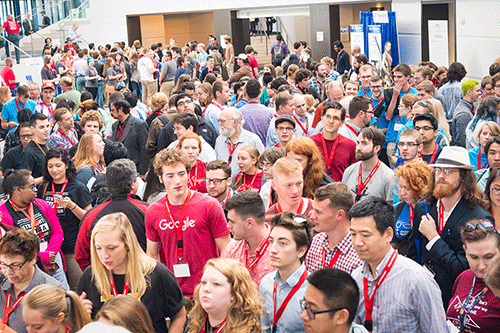Meetings: Why College Students Choose Physics
Looking around at this year’s PhysCon meeting in San Francisco, you were a lot more likely to see pink hair or a nose ring than a jacket and tie. And forget the usual polite applause: speakers at this meeting receive whoops and hollers. These signs of youth and enthusiasm for physics are typical of the quadrennial conference, which brings together undergraduate physics majors from Society of Physics Students chapters nationwide. This year a record 1000 students attended—possibly the largest gathering of physics majors ever—and at least one-third of them were women. The program included plenary talks by luminaries such as Eric Cornell, Jocelyn Bell Burnell, and Neil Turok; tours of SLAC and Google; and workshops on topics such as communicating physics and careers for physics bachelor's degree holders.
It was also the place to find out, over meals and during poster sessions, what draws young people to physics. Students’ responses suggested two themes: teachers are a critical influence, and engineering is a common route to physics.
Many students mentioned an inspiring high school teacher. “He was excited about what he was doing, which made me want to be excited about it,” says Mark Giovinazzi, a Drexel University junior, recalling his 12th grade physics teacher. One unforgettable lesson from that teacher was that “physics teaches you a new way to think.” And after a few years with the subject, Giovinazzi agrees. “I have a better understanding of the world,” he says.
Davidson College junior Colin Epstein remembers the day in his high school class when students had to predict the impact point of a projectile. “It was this amazing moment to me when we actually pulled the trigger, and the ball went and landed within 1 or 2 inches of where we had predicted,” says Epstein. “This idea that all these numbers and equations on the board were real. It was what described real life, and that was it for me.”
Several students said they had initially intended to major in engineering but were turned off by the subject. “What became apparent really quickly to me was that while engineers are problem solvers, they’re not really interested in the nature of the problems they’re solving,” says senior Ezra Engel of the US Military Academy at West Point. He says that in engineering classes students are often given equations to use without derivation. When he asked where equations came from he was told, “Oh, it was developed by physicists; don’t worry about it,” which Engel found unsatisfying. “I like the questions that physics tries to get at a lot more than the questions the engineers were trying to get at,” he says. Senior William Helmer of the University of San Diego feels similarly. “I didn’t feel like I was getting enough of the ‘why’ in the engineering program.” In physics, he says, “we can always go to some deeper explanation.”
Such an interest in fundamental questions seemed to be the strongest motivation for most students. “It’s a very innate human desire to understand how the world works,” says senior Samantha Spytek of Virginia Tech. And as a bonus, physics is a good starting point, even if you switch scientific fields later, says junior Lauren Selensky of Abilene Christian University. “I thought if I learned physics, I could do anything else I wanted,” she says. “It’s like, once you know Latin, the other Romance languages aren’t hard.”
–David Ehrenstein





